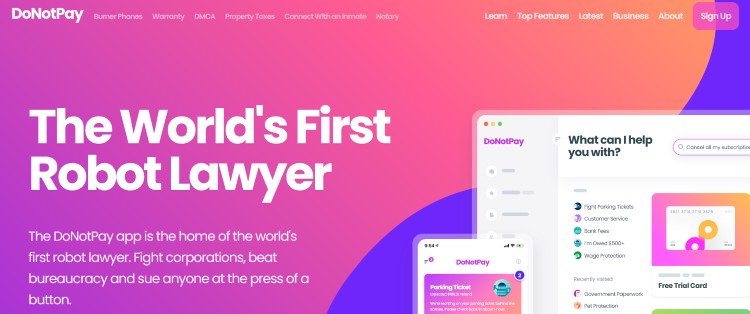DoNotPay doesn’t live up to its billing as a 'robot lawyer,' offers 'substandard' legal docs, suit claims

Screenshot from the DoNotPay website.
A would-be class action lawsuit alleges that the DoNotPay website is engaged in the unauthorized practice of law and is harming its customers by providing legal services that are “substandard and poorly done.”
The March 3 suit alleges that DoNotPay violated California’s unfair competition law by holding itself out as a lawyer to California residents and by selling legal services there without a law license.
Courthouse News Service and Law.com have coverage.
The DoNotPay legal chatbot was founded in 2015 to help people fight traffic tickets, but it later expanded to help people with immigration applications, small-claims suits and other legal matters. Its founder, Joshua Browder, is a 2017 ABA Journal Legal Rebel.

Joshua Browder. Photo by Tony Avelar/ABA Journal.
The suit notes that the DoNotPay website claims to be the “world’s first robot lawyer.”
“Unfortunately for its customers,” the suit says, “DoNotPay is not actually a robot, a lawyer, nor a law firm. DoNotPay does not have a law degree, is not barred in any jurisdiction, and is not supervised by any lawyer. DoNotPay is merely a website with a repository of—unfortunately, substandard—legal documents that at best fills in a legal adlib based on information input by customers.”
The suit was filed in San Francisco superior court by the Edelson law firm. Lawyer Jay Edelson announced the filing of the suit in a March 6 tweet.
The name plaintiff in the suit is Jonathan Faridian, who said he used DoNotPay to draft demand letters, an independent contractor agreement, a small-claims court filing, two LLC operating agreements, and a discrimination complaint with the Equal Employment Opportunity Commission.
But some of the documents “were so poorly or inaccurately drafted that he could not even use them,” the suit says. Demand letters that were supposed to be sent to the opposing party were returned undelivered to Faridian’s home. When Faridian opened one of the letters, a blank piece of paper was inside. He also requested an agency agreement for an online marketing business that he wanted to start, but the language didn’t seem to apply to his business.
Browder was in the news in January, when he said he would use DoNotPay to assist two defendants when they appear before judges to fight speeding tickets. He changed his mind when he heard from state bar associations that were concerned about unauthorized practice of law.
He tweeted that his company’s nonconsumer legal products, such as defamation demand letters and divorce agreements, would be removed from his website. But they were still online when the suit was drafted, according to the suit.
DoNotPay gave this statement to Courthouse News Service and Law.com: “The named plaintiff has submitted dozens of cases and seen significant success with our products,” the company said. “The case is being filed by a lawyer that has personally made hundreds of millions from class actions, so it’s not surprising that he would accuse an AI of ‘unauthorized practice of law.’ Once we respond in court, this will be cleared up.”



